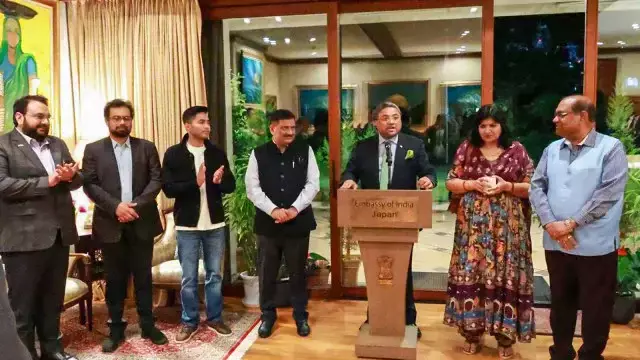
Non-violence is our choice, not compulsion, delegates tell Japan
In a strong and resolute message to the world, a high-level all-party delegation led by Sanjay Jha of the Janata Dal (United) emphatically stated that non-violence is India’s choice, not compulsion. The delegation, which included representatives from various political parties, conveyed this message to top officials in Japan, underscoring India’s commitment to peace and unity in the face of terror threats.
The delegation’s visit to Japan comes at a time when India is grappling with the aftermath of the Pulwama terror attack, which left dozens of Indian security personnel dead. In the aftermath of the attack, India responded with a surgical strike across the Line of Control (LoC), targeting terrorist camps in Pakistan-occupied Kashmir.
During their meeting with Japanese officials, the delegation made it clear that India’s response to terror is not driven by compulsion, but by a deep commitment to non-violence. “Non-violence is our choice, not our compulsion,” Jha said, emphasizing that India will always prioritize peace and unity in its response to terror threats.
When asked by Japanese officials about India’s response to the terror attack, the delegation clarified that it was Pakistan’s Director-General of Military Operations (DGMO) who called for a ceasefire, which led India to agree to it. This statement underscores the fact that India’s response to terror is always guided by a desire to maintain peace and stability, rather than out of compulsion or aggression.
The delegation’s message is significant, as it underscores India’s commitment to non-violence and its willingness to engage in dialogue and diplomacy to resolve conflicts. It also sends a strong signal to Pakistan and other countries that sponsor terrorism, that India will not be intimidated or coerced into responding to terror threats with aggression.
India’s commitment to non-violence is not just a rhetorical statement, but a deeply ingrained value that is reflected in its history and culture. From Mahatma Gandhi’s Non-Cooperation Movement to India’s nuclear tests in the 1990s, the country has consistently demonstrated its willingness to prioritize peace and non-violence over aggression and coercion.
In recent years, India has made significant strides in promoting non-violence and conflict resolution. The country has established a robust diplomacy framework, which emphasizes dialogue and cooperation over confrontation and aggression. India has also been actively engaged in international efforts to combat terrorism, including the United Nations’ efforts to designate terrorist organizations as such.
The delegation’s visit to Japan is also significant, as it underscores the growing importance of India-Japan relations in the region. Japan is one of India’s closest allies in the region, and the two countries have been working together to promote peace and stability in the Asia-Pacific region. The delegation’s message of non-violence and commitment to peace is likely to resonate with Japanese officials, who have been working to promote their own brand of pacifism and non-violence.
In conclusion, the all-party delegation’s visit to Japan and its message of non-violence is a powerful statement of India’s commitment to peace and unity in the face of terror threats. India’s response to terror is not driven by compulsion, but by a deep commitment to non-violence and a desire to maintain peace and stability. As the country continues to navigate the complex landscape of terrorism and geopolitics, its commitment to non-violence and conflict resolution will remain a beacon of hope for peace and stability in the region.






